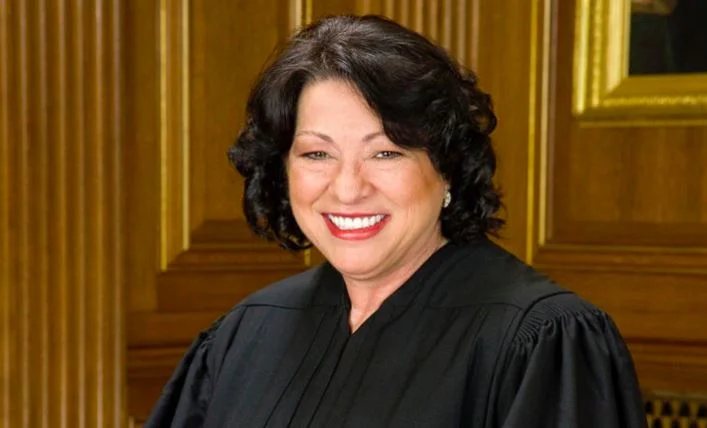
Sonia Sotomayor Ethnicity and Parents Origin
Sonia Sotomayor, an Associate Justice of the United States Supreme Court, has had a remarkable journey from her humble beginnings to becoming the first Latina to serve on the highest court in the United States. Her heritage plays a significant role in shaping her identity and perspectives, both personally and professionally. Born on June 25, 1954, in the Bronx, New York City, Sotomayor embodies Puerto Rican culture through her ethnicity and parents’ origins, reflecting the broader story of the Puerto Rican diaspora in America.
Sonia Sotomayor Ethnicity and Cultural Heritage
| Category | Influencers |
|---|---|
| Full Name | Sonia Sotomayor. |
| Birthdate | June 25, 1954. |
| Birthplace | Bronx, New York. |
| Ethnicity | Puerto Rican descent. |
| Father Ethnicity | Puerto Rican descent. |
| Mother Ethnicity | Puerto Rican descent. |
Sonia Sotomayor identifies as a Latina of Puerto Rican descent, a key aspect of her identity that has significantly influenced her life and career. Growing up in a predominantly Puerto Rican neighborhood in the Bronx, she was immersed in a culture that celebrated its heritage through language, traditions, and community values. This strong cultural foundation instilled in her a sense of pride and responsibility toward her roots, shaping her perspective on social justice and equality.
Sonia Sotomayor Puerto Rican Cultural History
Puerto Rico, an unincorporated territory of the United States, has a rich and complex cultural history. Its origins are deeply rooted in the Indigenous Taino population, who were the island’s original inhabitants. Over centuries, the island underwent significant changes due to Spanish colonization, which introduced new languages, religions, and customs. Additionally, the transatlantic slave trade brought African influences, contributing to the island’s diverse cultural tapestry. This historical blend of Indigenous, Spanish, and African elements forms the backbone of Puerto Rican culture, influencing its music, art, cuisine, and community life.
Sotomayor’s upbringing in this vibrant cultural environment helped her develop a multifaceted identity that celebrates diversity and resilience. She often reflects on how these influences have shaped her values, emphasizing the importance of community and shared experiences.
Sonia Sotomayor Connection to Heritage
Growing up in a Puerto Rican household, Sotomayor formed a deep connection to her heritage. Her family celebrated traditional Puerto Rican customs and spoke Spanish at home, enabling her to navigate both cultures seamlessly. This bilingual upbringing fostered a sense of belonging and equipped her to communicate and connect with a broader range of people throughout her life.
Her experiences in the Bronx, where she witnessed the challenges faced by her community, fueled her desire to advocate for justice and equity. She often credits her mother for instilling the values of education and hard work, which are deeply embedded in Puerto Rican culture. This strong connection to her roots drives her to become a voice for underrepresented communities, emphasizing the need for greater representation in all aspects of society.
Sonia Sotomayor Influence on Judicial Philosophy
As the first Latina Supreme Court Justice, Sonia Sotomayor has consistently highlighted how her cultural background influences her worldview and decision-making process. In her speeches and writings, she often discusses the significance of diversity within the judiciary and the importance of having judges who understand the experiences of different communities.
Her ethnicity plays a critical role in her empathetic approach to the law. Sotomayor frequently emphasizes that her life experiences as a Latina inform her understanding of justice, particularly in cases involving civil rights, immigration, and social equity. She believes that personal experiences can enrich judicial decision-making, providing a broader perspective that considers the realities faced by marginalized groups.
In her landmark speeches, she has called for a judiciary that reflects the diverse makeup of the country, arguing that such representation is essential for achieving true justice. By sharing her story and the lessons learned from her heritage, Sotomayor aims to inspire future generations of Latino leaders and advocates for social justice.
Sonia Sotomayor Parents’ Origin
Sonia Sotomayor was born to Puerto Rican parents, Celina Báez and Juan Sotomayor, who migrated from Puerto Rico to New York in the 1940s. Her mother, Celina, was born in Lajas, Puerto Rico, and worked as a telephone operator and later as a nurse. Celina instilled in Sonia a strong work ethic and the value of education, playing a critical role in shaping her daughter’s future success. Despite limited financial resources, Celina ensured that Sonia and her brother, Juan Jr., received quality education and opportunities.
Sotomayor’s father, Juan Sotomayor, was born in Santurce, Puerto Rico. He worked as a tool and die worker but struggled with alcoholism, which led to his untimely death when Sonia was just nine years old. Juan’s passing left Celina as the sole provider for the family, a situation that contributed to Sonia’s resilience and determination to overcome adversity.
The Sotomayor family story reflects the broader experiences of Puerto Rican migrants who came to the mainland United States in search of better economic opportunities. Like many families from the island, they faced challenges adjusting to life in New York while maintaining a connection to their Puerto Rican heritage. Sonia Sotomayor’s upbringing in a bilingual household, where Spanish and English were both spoken, also allowed her to navigate between two cultures seamlessly. This cultural duality became an asset in her legal career, where her ability to understand different perspectives became a hallmark of her judicial approach.
Sonia Sotomayor’s Siblings A Family Overview
Sonia Sotomayor, the first Latina Supreme Court Justice in the United States, was not only shaped by her heritage and experiences but also by her close-knit family. Growing up in the Bronx, New York, she had a brother, Juan Sotomayor, who played a significant role in her early life. Their relationship and familial bonds have influenced Sonia’s values and approach to life, education, and career.
Sonia Sotomayor Juan Sotomayor Sonia’s Only Sibling
Sonia Sotomayor’s only sibling is her younger brother, Juan Sotomayor. Born in 1957, Juan experienced a similar upbringing in the Bronx alongside Sonia. The two siblings shared a close relationship, characterized by mutual support and understanding as they navigated the challenges of growing up in a single-parent household after the death of their father when Sonia was just nine years old.
Juan Sotomayor pursued a career in education and has worked as a professor, reflecting the value that both he and Sonia place on education and knowledge. Sonia and Juan have strengthened their bond through their shared experiences and their mother’s dedication to ensuring they both receive a solid education despite their family’s financial struggles.
Sonia Sotomayor Family Values and Influence
The Sotomayor siblings were raised by their mother, Celina, who instilled in them a strong work ethic and the importance of education. Celina’s sacrifices and determination had a profound impact on Sonia and Juan, shaping their ambitions and aspirations. Their mother emphasized the value of perseverance, which became a cornerstone of Sonia’s eventual success as a lawyer and judge.
Throughout her career, Sonia Sotomayor has often spoken about the influence of her family, particularly the role of her brother in her life. The support and camaraderie between the siblings allowed them to face adversity together, fostering a strong sense of resilience. They maintained a close relationship into adulthood, providing encouragement and guidance as they pursued their respective paths.
Sonia Sotomayor Impact of Her Heritage
Sonia Sotomayor’s Puerto Rican heritage has been a powerful and enduring influence throughout her career. Raised in a culturally rich environment, she often credits her mother, Celina Báez, and the broader Puerto Rican community for shaping her values of hard work, perseverance, and compassion. Her autobiography, My Beloved World, delves deeply into her upbringing, emphasizing the profound connection she feels to her Puerto Rican roots. In the book, she highlights the struggles and sacrifices her parents made, which instilled in her a sense of resilience and pride in her heritage. This strong cultural foundation has played a crucial role in her approach to law and justice, where empathy and understanding of different life experiences are key.
Her ethnicity has also been an inspiration for the Latino community in the United States and beyond. As the first Latina Supreme Court Justice, Sotomayor’s presence on the bench represents significant progress for Latino representation in the U.S. judiciary. Many see her as a trailblazer who overcame numerous obstacles to reach the highest levels of public service. She frequently engages with the Latino community, championing causes related to education, social justice, and equal opportunity. Through her advocacy, Sotomayor works to ensure that marginalized communities, particularly Latinos, have better access to education and greater opportunities for success.
Sonia Sotomayor Professional Career
Sonia Sotomayor’s professional journey is marked by perseverance, dedication, and an unwavering commitment to justice. After completing her high school education at Cardinal Spellman High School in the Bronx, she attended Princeton University, where she graduated summa cum laude in 1976 with a degree in sociology and anthropology. During her time at Princeton, she was involved in various extracurricular activities and developed a strong interest in social justice issues.
Following her undergraduate studies, Sotomayor enrolled at Yale Law School, where she earned her Juris Doctor degree in 1979. At Yale, she served as an editor for the Yale Law Journal and graduated with honors. Her education laid a strong foundation for her future career, equipping her with the skills and knowledge necessary to navigate the complex legal landscape.
Sonia Sotomayor Legal Practice and Early Work
After graduating from Yale, Sotomayor began her legal career as an assistant district attorney in New York County, where she worked under District Attorney Robert Morgenthau. In this role, she prosecuted various criminal cases, including homicides, which provided her with valuable courtroom experience. Her work in the district attorney’s office honed her skills in litigation and trial advocacy.
In 1984, Sotomayor transitioned to private practice, joining the law firm Pavia & Harcourt as an associate. Here, she focused on intellectual property law and commercial litigation, gaining insight into the intricacies of corporate law. After several years, she moved on to serve as a partner at the law firm of King & Spalding, further expanding her legal expertise.
Sonia Sotomayor Judicial Career
Sotomayor’s judicial career began in 1992 when she was nominated by President George H.W. Bush to serve as a judge on the U.S. District Court for the Southern District of New York. Her appointment marked a significant milestone in her career, as she became the first Hispanic woman to serve as a federal judge. During her time on the District Court, she presided over a wide range of cases, including civil rights, discrimination, and employment law, earning a reputation for her fair and impartial approach.
In 2009, President Barack Obama nominated Sotomayor to the U.S. Court of Appeals for the Second Circuit. Advocacy groups and individuals widely supported her confirmation process, recognizing her extensive legal experience and commitment to social justice. The Senate confirmed her in August 2009, making her the first Hispanic woman to serve on the appellate court.
During her tenure on the Second Circuit, Sotomayor authored several notable opinions on various issues, including voting rights, immigration, and criminal justice. She gained recognition for her ability to bridge the gap between legal theory and practical application, often emphasizing the human impact of judicial decisions.
Sonia Sotomayor Supreme Court Appointment
Sonia Sotomayor’s most significant professional achievement came in May 2009 when President Obama nominated her to the U.S. Supreme Court to fill the vacancy left by Justice David Souter. People met her nomination with both excitement and scrutiny as she became the first Latina and the third woman to serve on the Supreme Court.
Her confirmation hearings were marked by discussions of her judicial philosophy and experiences as a Latina. In August 2009, the Senate confirmed her appointment, and she officially took her seat on the Supreme Court on September 8, 2009. Since then, Sotomayor has been an influential voice on the Court, advocating for issues such as affirmative action, voting rights, and reproductive rights.
Sonia Sotomayor Impact and Legacy
Justice Sotomayor’s contributions to the Supreme Court have been significant, particularly in cases involving social justice, civil rights, and the intersection of race and law. She is known for her strong dissenting opinions, which often highlight the experiences of marginalized communities. Her judicial philosophy emphasizes empathy and the importance of considering the broader implications of legal decisions on individuals and society.
Sotomayor has also been an outspoken advocate for increasing diversity within the legal profession and the judiciary. Her presence on the Supreme Court has inspired many young people, particularly Latinos and women, to pursue careers in law and public service.



